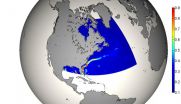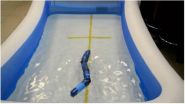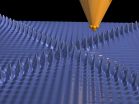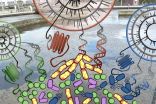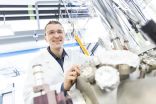(Press-News.org) The ocean is undergoing global changes at a remarkable pace and we must change with it to attain our best possible future ocean, warns the head of The University of Western Australia's Oceans Institute.
One of the global leaders in ocean science, Professor Carlos Duarte has shared his insights on the future of the world's oceans in a paper published in the international open-access journal Frontiers in Marine Science.
In the paper Professor Duarte explains the grand challenge researchers face in addressing global change and the future state of the ocean.
"The ocean is under significant impact by anthropogenic global pressures such as ocean acidification, warming, overfishing and pollution, resulting from the impact of human activity on major processes that regulate the functions of the planet," he said.
"Dependence on resources including water, energy and key elements has prompted a suite of changes at the global scale and we are now facing the impacts of climate change, a loss of biodiversity and deteriorating water quality.
"While human pressures such as overfishing have occurred for almost 200,000 years, the cumulative impact of these combined pressures in recent years is now significantly influencing ocean health through unprecedented pressures.
"Consequently, planning of infrastructure, resource management, industry operations and conservation policies all require the capacity to anticipate change and forecast the likely properties of the future ocean."
Professor Duarte explained that a number of conclusions can be forecast by analysing current ocean trends.
"By the end of the twenty-first Century the oceans will be warmer, with a reduced ice extent, higher sea levels, more acidic and with somewhat lower oxygen levels than at present," he said.
"Research effort must be directed to understanding the responses of marine systems to these multiple, cumulative pressures."
Professor Duarte advises that policy makers, the public and the scientific community should accept change as a prerequisite to manage it. He emphasises the need for partnerships to frame research findings in effective ways and foster widespread action.
"Close cooperation between these groups is needed to progress our capacity to manage ocean problems adaptively," Professor Duarte said.
"The future ocean will be, no doubt, different in many ways from the ocean we enjoy today, but we can still direct that change. In order to get back behind the steering wheel the goals of policy makers, the public and scientists must converge to guide this change in order to achieve our best possible future ocean."
Professor Duarte was recently appointed Editor-in-Chief of the newly launched journal and will maintain a position with the UWA as an Adjunct Professor following his departure from the UWA Oceans Institute.
The UWA Oceans Institute strives to deliver ocean-based solutions for humanity's grand challenges.
INFORMATION:
1. Media reference
Winthrop Professor Carlos Duarte
Director, UWA Oceans Institute; School of Plant Biology
Tel. +61 427133066
David Stacey
UWA Media Manager
Tel. +61 864883229 / +61 432637716
E-mail: david.stacey@uwa.edu.au
2. For online articles, please include a link to the article, which will appear on the following active URL:
http://journal.frontiersin.org/Journal/10.3389/fmars.2014.00063/full
Article title: Global Change and the Future Ocean: A Grand Challenge for Marine Sciences
Journal: Frontiers in Marine Science
DOI: doi: 10.3389/fmars.2014.00063
Author: Carlos M. Duarte
3. About UWA's Ocean Institute
The UWA Oceans Institute brings together the strength if UWA's researchers into a multidisciplinary, integrated research focus. The goal is to capitalise on UWA's existing research strengths- in areas such as oceanography, ecology, engineering, resource management and governance-and utilise them to deliver ocean solutions for humanity's grand challenges.
4. About Frontiers
Frontiers is a community-driven open-access publisher and research networking platform. Established by scientists in 2007, Frontiers drives innovations in peer-review, article level metrics, post publication review, democratic evaluation, research networking and a growing ecosystem of open-science tools. The "Frontiers in" journal series has published 25,000 peer-reviewed articles across 49 journals, which receive 6 million monthly views, and are supported by over 160,000 leading researchers worldwide. In 2014, Frontiers won the ALPSP Innovation in Publishing Award. For more information, visit: http://www.frontiersin.org
This news release is available in German. Just four months after the final data package from the GOCE satellite mission was delivered, researchers are laying out a rich harvest of scientific results, with the promise of more to come. A mission of the European Space Agency (ESA), the Gravity Field and Steady-State Ocean Circulation Explorer (GOCE) provided the most accurate measurements yet of Earth's gravitational field. The GOCE Gravity Consortium, coordinated by the Technische Universität München (TUM), produced all of the mission's data products including ...
The value of a piece of chocolate cake can change. Someone who happens to be on a diet is more likely to choose a fruit dessert and judge the calorie-laden cake as unhealthy. Previous studies have shown that a specific network in the brain is active when a person must decide between various choices that vary depending on context. They emphasize the interaction between neurons in two brain areas of the prefrontal cortex - the controlling area on the front side of the brain.
Prefrontal cortex shows increased activity in all decisions
Sarah Rudorf and Todd Hare of the ...
On 24 October 2014, Sweden called off the hunt for a submarine after a week-long underwater search in the Stockholm archipelago. Triggered by a reported sighting of a Russian submarine, the alleged 'invasion' had been widely anticipated by military specialists and the media.
"Our assessment is that in the inner archipelago there was a plausible foreign underwater operation," Rear Adm. Anders Grenstad commented, "But we believe that what has violated Swedish waters has left."
"Whatever was there could not have been a conventional submarine," Grenstad said, but a "craft ...
This news release is available in Japanese.
The deep ocean seems so remote that it is difficult to imagine any sort of human-generated change making an impact on deep-sea life. It is even more difficult to collect or examine evidence from the deep ocean to determine what those impacts might be. Enter the barnacle; a hard, sessile creature that looks like a tiny volcano and attaches to rocks, boat bottoms, and other hard substrates, where it filters ocean water to feed on tiny organisms. The barnacle holds clues about how climate change is affecting the deep ocean. ...
KNOXVILLE - Warfare not only hastened human technological progress and vast social and political changes, but may have greatly contributed to the evolutionary emergence of humans' high intelligence and ability to work together toward common goals, according to a new study from the National Institute for Mathematical and Biological Synthesis (NIMBioS).
How humans evolved high intelligence, required for complex collaborative activities, despite the various costs of having a big brain has long puzzled evolutionary biologists. While the human brain represents only about two ...
Published in the journal Nature, the discovery could revolutionise fuel cells and other hydrogen-based technologies as they require a barrier that only allow protons - hydrogen atoms stripped off their electrons - to pass through.
In addition, graphene membranes could be used to sieve hydrogen gas out of the atmosphere, where it is present in minute quantities, creating the possibility of electric generators powered by air.
One-atom thick material graphene, first isolated and explored in 2004 by a team at The University of Manchester, is renowned for its barrier properties, ...
NGC 3532 is a bright open cluster located some 1300 light-years away in the constellation of Carina(The Keel of the ship Argo). It is informally known as the Wishing Well Cluster, as it resembles scattered silver coins which have been dropped into a well. It is also referred to as the Football Cluster, although how appropriate this is depends on which side of the Atlantic you live. It acquired the name because of its oval shape, which citizens of rugby-playing nations might see as resembling a rugby ball.
This very bright star cluster is easily seen with the naked eye ...
Jülich, 26 November 2014 - In metals such as copper or aluminium, so-called conduction electrons are able to move around freely, in the same way as particles in a gas or a liquid. If, however, impurities are implanted into the metal's crystal lattice, the electrons cluster together in a uniform pattern around the point of interference, resembling the ripples that occur when a stone is thrown into a pool of water. Scientists in Jülich have, with the help of computer simulations, now discovered a combination of materials that strengthens these Friedel oscillations ...
The Luxembourg Centre for Systems Biomedicine (LCSB) has succeeded for the first time in describing the complex relationships within an ecosystem in unprecedented detail. For their work, carried out in collaboration with US and Luxembourg partners, their model ecosystem was a "biological wastewater treatment plant". In it live numerous species of bacteria which are involved in the wastewater purification process.
LCSB director Prof. Dr. Rudi Balling stresses the medical importance of these research efforts: "Bacterial ecosystems also play a major role in our health. ...
Although the van der Waals force was discovered around 150 years ago, it is still difficult to quantify when predicting the behaviour of solids, liquids, and molecules. Precise measurements were only possible up to now for single atoms or macroscopic objects. However, the van der Waals forces are particularly important at intermediate size, where they crucially co-determine the behaviour of complex molecules, such as biomolecules and proteins. They are also responsible for the functioning of certain adhesives and are the reason why geckos can adhere so amazingly well to ...
